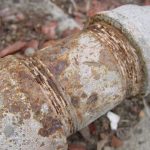Copper pipes are the only types of plumbing pipes that can have pinhole leaks that are almost too small to see. Although pinhole leaks start out small, they can lead to more serious problems later if they are not detected and fixed. Let’s take a look at how pinhole leaks form, how you can identify them and what you can do about the problem.
A Brief Copper Pipe Primer
Copper is an easy to work with material that’s durable enough for most modern plumbing applications. But, they will start to break down sooner or later due to corrosion and the weakening of the inner pipe wall that follows. This may seem strange if you understand metals because copper is renowned for its rust resistant properties. This would be true under ideal circumstances when the water would have a lower level of mineral content. Sadly, for most American homes a supply of hard water can cause pinhole leaks to form in copper pipes. The problem will not go away without help from your local plumber and it will only get worse over time. If the damage is too severe it may be necessary to replace the entire copper pipe plumbing system.
How Are Pinhole Leaks Formed?
Hard water can contain certain corrosive materials that will degrade the structure of copper plumbing pipes. Gradually, these materials eat away at the metal until small pinholes form at various locations on the surface. Some of these corrosive materials include grit, sediment, sand, dirt, and more. They scrub away at the inner wall of the plumbing pipe until it begins to lose integrity. Identifying the signs of a pinhole leak can be tricky if you don’t know what to look for.
How Do I Identify a Pinhole Leak?
This may seem obvious, but if you want to find a pinhole leak you have to look for it first. After all, these types of leaks are regarded as “slow leaks” by your local professional plumber and they can be hard to identify. The worst part about a pinhole leak isn’t the volume of water that it releases in a single moment like a burst. Pinhole leaks can endure for a long time, which means that they can release a larger volume of water than you might expect. The moisture released from the pipe can infiltrate the wall cavities and compromise the insulation in your home. Eventually, you may see damp patches on walls or a puddle, but that is a late stage occurrence. The best way to check for pinhole leaks is to schedule a regular plumbing inspection to assess the health of your entire system.
How Long Should My Copper Pipes Last?
A residential grade copper plumbing pipe would last for decades under normal conditions. A pipe could last for 20 or even 50 years under ideal operating conditions, but around 85% of American homes receive hard water. If you have high quality thick copper pipes, they will last longer than thinner pipes.
What Can I Do?
Contact your local licensed and certified plumber and ask them about a health check for your plumbing system. If your home was constructed in the 80s or 90s, it’s likely that you have copper pipes and pinhole leaks are more likely. In many cases, it’s a good idea to invest in a replacement to install new pipes that are not affected by hard water.





